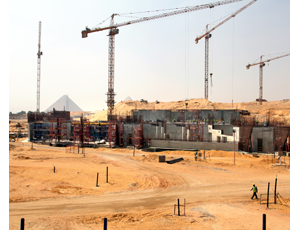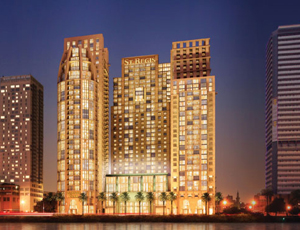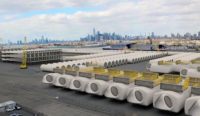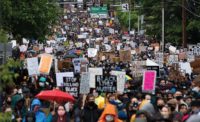

Two years after tumultuous regime change in Egypt, global construction firms in-country and outside are once again watching whether the formation of a new government, following the July 3 ouster of Islamist Mohamed Morsi, will jumpstart projects, some that have stalled since the era of former President Hosni Mubarak.
Many see developments in Egypt as key to outcomes in the entire region and a sign of whether economic stability will return to the nation. "You can't overestimate the impact this turmoil has on the region," says Peter Zuk, a former AECOM executive based in Libya. "It is the largest country in the Arab bloc."
Firms offer mixed reports of construction impacts from the most recent political turbulence that has included violent and fatal protest clashes, as well as from past Islamist rule during which some projects halted or dramatically slowed as domestic and foreign investors pulled away.
Business as Usual
Some executives claim work is continuing with little interruption. "Current troubles in Egypt are not affecting contracts or works," says a spokesman for Paris-based VINCI Group, which is working on 7.2 kilometers of new tunnels on the Cairo Metro Line 3.
Waleed Abdel-Fattah, senior vice president and North Africa regional manager for Hill International in Cairo, adds that "in general, our projects continued business as usual since the last week of June to date, except for three days where we had to shut down construction sites."
He says project staff includes the New Jersey-baed construction manager's own expatriates and those of contractors on projects, including two hotels in Cairo and the estimated $800-million Grand Egyptian Museum in Giza, set to be the one of the world's largest museums when completed in 2015. "Once political stability is established, we believe the Egyptian market will have further major opportunities for Hill," says Abdel-Fattah.
Hesham El Halaby, an investor relations manager for Egyptian contractor Orascom Construction Industries, also claims no major disruptions at its sites, although an online report in Arabianbusiness.com earlier in July said that investment firm UBS had cut its price target on the firm's stock because of an anticipated impact on profits caused by likely delays in its project tenders and by government reviews of its long-term gas supply contracts in Egypt and Algeria.
But other firms note needed changes on site as turmoil escalated more recently and project slowdowns that hve continued since the start of the Morsi era.
Netherlands-based design firm Netherlands Airport Consultants, a unit of Royal HaskoningDHV, Amersfoort, has postponed expatriate site visits until the end of July to its project to upgrade the 170,000-sq-meter Terminal 2 at Cairo Airport because of the unrest, says a spokeswoman. Work on the estimated $400-million job is scheduled for completion this year.
Marina Vasiljevic, marketing director for IK Consulting Engineers Ltd., Belgrade, Serbia, says her firm's design contracts on water treatment plants were "frozen" during the recent political turmoil. "Ever since, they did not contact us and the projects are still frozen," she says. "In the present situation, we would not send our employees there, since it is very risky."
Adds Vasiljevic, "Working in Serbia and ex-Yugoslavia, unfortunately I know how much business is affected once the political situation gets worse. It also could be expected that a number of educated people will try to leave Egypt and find jobs elsewhere."
Impacts
"Our projects have been dramatically impacted," says Nunzio DeSantis, executive vice president of Dallas-based design firm HKS. The firm's work in Egypt includes the estimated $1-billion, 197,000-sq-meter Nile Corniche Towers mixed-use project in Cairo and planned MGM Grand and Four Seasons hotel complexes in the Red Sea resort of Sharm El Sheikh.
He notes changes in construction funding and pace. "Organizations in the country are not stable," says DeSantis, noting added difficulties in procuring needed labor and materials.
DeSantis says work is continuing on the Nile Corniche project, owned and funded by Qatar-based Qatari Diar Real Estate Investment Co. But an original 2014 completion date has extended to 2016 as more "realistic," says one report.
According to DeSantis, the two resort projects, that were started "years ago, would have been well opened by now. It's been a very difficult place to get something done. We started in Egypt in 2008. Some projects have stopped dead in their tracks."
Shawn Basler, who heads the global hospitality group for architect Perkins Eastman, also notes a hold on Baia Blanca, another Sharm El Sheikh resort on which it was working that had been set for 2012 completion. "For foreign investors, the risk is too high. The government never grabbed the reigns and had control. It was not cohesive. Everyone looks at Egypt and wants it to get back to being a good place to invest."
Basler is hopeful that new RFPs for health care projects will proceed and that a master plan for a new development in Cairo will gain municipal approval. "There's been some progress in the past year, but not to the scale where it should be," he says.
"Under Morsi, clients couldn’t get economic stability. A lot of developers from the Mubarak era have left. They were the driving force," he says. "Morsi didn’t have the vision to move things forward. A positive move will be a new pro-development group in place."
Says Tom Hewitt, KBR senior vice president for commercial: "Egypt is up in the air." He says the firm has no ongoing construction there but does have an ownership position in an ammonia plant on the Red Sea that has operated below 50% capacity since the end of 2012 due to natural gas shortages caused by economic conditions under Morsi.
"If a stable new regime is established and economic conditions stabilize and improve, we expect the gas shortage could be remedied in two to four years’ time. Of course, if political conditions go the other direction, assets could be expropriated."
According to Hewitt, "Egypt reportedly has not paid large amounts owed to foreign exploration companies who refuse to drill new wells until they are paid for past work. Thus, the natural run-off of existing wells combined with increased demand for gas has created a shortage."
Also unclear is the status of work on the estimated $1.5-billion El Dabaa nuclear powerplant, a 1,000-MW complex set to be built on Egypt's Mediterranean coast.
The project had been expected to launch after parliamentary elections were held, which were originally set for last March but postponed. With the new change in government, those now are set for next February, followed by a presidential vote.
Erica Waddell, a spokeswoman for Australia-based WorleyParsons, which is a project consultant, declined comment on the status of the El Dabaa project. But, says Tasman Graham, the firm's global director of environment and society, "we continue to execute project work in hand, and so far no projects have been cancelled or put on hold."






Post a comment to this article
Report Abusive Comment